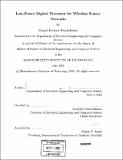Low-power digital processor for wireless sensor networks
Author(s)
Finchelstein, Daniel Frederic
DownloadFull printable version (5.849Mb)
Other Contributors
Massachusetts Institute of Technology. Dept. of Electrical Engineering and Computer Science.
Advisor
Anantha Chandrakasan.
Terms of use
Metadata
Show full item recordAbstract
In order to make sensor networks cost-effective and practical, the electronic components of a wireless sensor node need to run for months to years on the same battery. This thesis explores the design of a low-power digital processor for these sensor nodes, employing techniques such as hardwired algorithms, lowered supply voltages, clock gating and subsystem shutdown. Prototypes were built on both a FPGA and ASIC platform, in order to verify functionality and characterize power consumption. The resulting 0.18[micro]m silicon fabricated in National Semiconductor Corporation's process was operational for supply voltages ranging from 0.5V to 1.8V. At the lowest operating voltage of 0.5V and a frequency of 100KHz, the chip performs 8 full-accuracy FFT computations per second and draws 1.2nJ of total energy per cycle. Although this energy/cycle metric does not surpass existing low-energy processors demonstrated in literature or commercial products, several low-power techniques are suggested that could drastically improve the energy metrics of a future implementation.
Description
Thesis (S.M.)--Massachusetts Institute of Technology, Dept. of Electrical Engineering and Computer Science, 2005. Includes bibliographical references (p. 69-72).
Date issued
2005Department
Massachusetts Institute of Technology. Department of Electrical Engineering and Computer SciencePublisher
Massachusetts Institute of Technology
Keywords
Electrical Engineering and Computer Science.